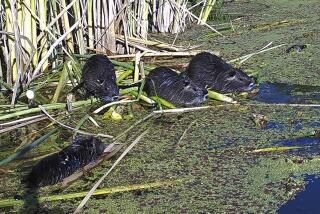Lure them, spray them, ignore them
- Share via
So now that you’ve got ants in your house or apartment -- and almost everybody does -- what can you do about them?
Currently, not a whole lot, at least legally.
“There is no magic bullet,” said Michael Rust, who specializes in the study of ants at UC Riverside.
The problem is that a lot of remedies now on supermarket shelves were created to battle indigenous ants that are protein eaters. But instead of ants on the Atkins diet, the invaders coming into local homes are mostly from Argentina and they love sweets.
These Argentine ants first arrived in the U.S. in the late 19th century, scientists believe, aboard ships carrying sugar and other staples.
They flourished in Southern California to the point that they’ve largely pushed out the native varieties.
“They come indoors at the end of the summer because water gets scarce,” said David Holway, an assistant professor of biology at UC San Diego.
But because they don’t care much for protein, the effect of ant trays is limited, Rust said. A new type of tray with sweet attractors now is being tested and could be on the market within a couple of years, he said.
Sprays can be effective, but only if they are used at the point of entry into the home, he said, and that’s not always easy to find.
Otherwise, the best defense is prevention. Holway emphasized keeping kitchens and other areas clean, especially of sweets. He also said low-water landscapes help.
“If we didn’t irrigate our yards so much, the ants wouldn’t have such damp places to live,” Holway said. “They get established, and then when it gets too hot, they come indoors.”
One of the most intriguing developments for the near future is a legal form of ant chalk.
A formula called Dead-Fast Insecticide Chalk has been approved by the EPA. The toxic ingredient is tralomethrin, commonly used in farming.
Attorney Bernard Segal, who registered the product with the EPA and plans to import it from China, said that although it’s highly effective, Dead-Fast does not pose much danger to children or animals in the approved formulation.
“They would have to ingest several sticks for it to be a major problem,” Segal said.
The only remaining regulatory hurdle in distributing Dead-Fast in California is final approval of the wording on the package and insert. Segal said he hoped to have the product in stores next summer.
No matter what happens, Holway said the ant invasions are usually temporary and don’t do substantial harm. “They don’t spread diseases and unlike the red fire ants, they don’t bite,” he said.
As he spoke, he could spot ants in his fourth-floor university office.
“But they sure can be a nuisance,” he said.
-- David Colker
More to Read
Sign up for Essential California
The most important California stories and recommendations in your inbox every morning.
You may occasionally receive promotional content from the Los Angeles Times.













